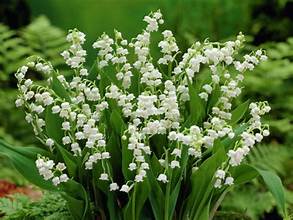2024 Dedh Pemp warn Ugens
De Yow, pempes warn ugens mis Genver
Thursday, 25th January
Hedhyw en class nei a glappyas a vis Genver. Eus dedh specyal en mis ma? Nena nei a brederas a eryow rag an dedhyow. Otta nebes. An pictour ew bleujyow Cala Me, lilys Helles. Nag ens flourys rag mis Genver. Flourys gwydn rag an mis ma ew bleujyow ergh.
In class today we talked of January. Is there a special day in this month? Then we thought of words for the days. Here are some. The picture is lilies of the valley, Helston lilies. They are not flowers for January. White flowers for this month are snowdrops.
A few words about days: Part One
In Late Cornish the usual word for “day” is dedh.
The plural is dedhyow (though not used with numbers).
In Middle Cornish (SWFM) the spelling is dydh.
This can also be used to mean “date”.
For a day’s duration we can use jorna.
e.g. every day keniver jorna
For days of the week, the word is de or dy. This is a stand-alone word; it is not an abbreviation of dedh or dydh. So, an apostrophe in de’ Yow or dy’ Yow is unnecessary.
A capital letter is not needed for ordinary days, only for special days, or if it is combined with its day name:
e.g. Saturday de Sadorn
e.g. Good Friday De Gwener an Grows (can lose the De)
e.g. Maundy Thursday De Yow Hablys (can be contracted to Deow Hablys).
e.g. Ash Wednesday De Merher Lüjiw
(Alternative spellings Merher ~ Marher, SWFM Mergher)
e.g. Tuesday can be de Meurth or Demeurth.
Shrove Tuesday De Meurh Enes
e.g. Monday can be de Lün or Delün
e.g. Palm Sunday De Sül Bleujyow or Desül Bleujyow
Remember the song that can be sung to the tune of ‘Clementine’:
Ema seyth dedh, ema seyth dedh,
ema seyth dedh en seythen;
de Sül, de Lün, de Meurth, de Merher,
de Yow, de Gwener, de Sadorn.
Special days in the calendar have their own word, Du, (given a capital letter).
e.g. Pentecost/Whitsun Du Pencast
or mutated p>f Du Fencast
e.g. Christmas Day Du Nadelik
e.g. Easter Day Du Pask
The Romans called the first day of every month the “calends”, signifying the start of a new lunar phase (with a new moon) and it was the day to pay off debts. Debts were recorded in "kalendaria" (accounts books).
This gives us a choice for English “calendar”:
lever-dedhyow (daybook) or calander
A "diary" or "journal" can be dedhlever or jornal.
Latin “calends” gives us Cornish terms for the first day of something.
e.g. Calan Gwav the first day of winter, November 1st (also called All Hallows, the day after Halloween)
e.g. Nos Calan Gwav Halloween (night before November 1st)
e.g. Calan Ebrel April Fools Day, April 1
Losing the final n we get
e.g. Cala Me May Day
The flower worn for the Helston Flora is
the lily of the valley bleujen Cala Me
The initial c may mutate c>h after Du
e.g. Du Halan an Vledhen New Year’s Day
e.g. Du Halan Gwav also for November 1st





Comments
Post a Comment